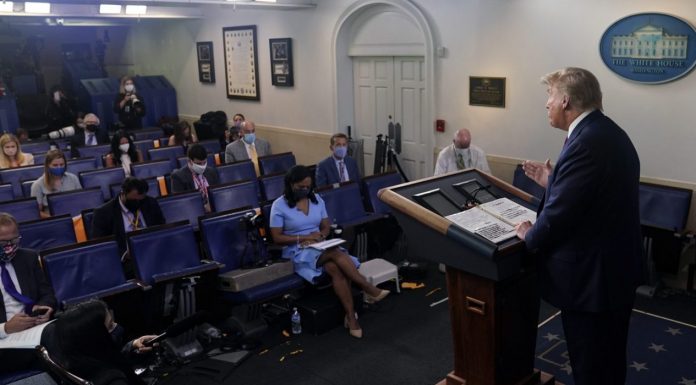The White House is threatening to veto a massive defense policy bill over a provision that would rename military bases such as Fort Bragg that are named after Confederate officers.
The veto threat Tuesday came hours before the House approved the $741 billion annual defense authorization, a sprawling, bipartisan bill that includes a 3% pay raise for U.S. troops.
The 295-125 vote sends the bill to the Senate, where lawmakers are considering a similar measure.
Rep. Adam Smith, D-Wash., chairman of the House Armed Services Committee, claimed that in the face of dueling national crises, it was essential for Republicans to reach across the aisle to capitulate to the House Democrats’ radical agenda.
“In our current political climate, characterized by partisanship and divisive leadership in the White House, it is increasingly important that Congress show the American people we are still capable of compromise,” Smith said.
In order to override a veto, both chambers would require a nearly insurmountable two-thirds majority. However, some Republicans fret that sailing against the manufactured tradewinds of the current racial frenzy could prove politically costly.
Still, others, fear that anything leveraging the sacred cow of defense spending is too risky to toy with.
The White House said it supported the overall spending figure, but it issued a 13-page statement expressing “serious concerns” about multiple provisions in the bill, including the renaming of some military institutions and limitations on the use of funds for Afghanistan that the White House said would seek to constrain the president’s war powers.
If the bill were presented to President Donald Trump in its current form, “his senior advisors would recommend that he veto it,” the White House said.
Trump also threatened a veto earlier this month, tweeting that the measure would lead to the renaming “Fort Bragg, Fort Robert E. Lee, and many other Military Bases from which we won Two World Wars.”
Trump has described the bases named for Confederate leaders as a part of American history, and he has defended flying the Confederate flag as “freedom of speech”—a position that even far-left groups like the American Civil Liberties Union have taken until recent years.
The statement released Tuesday describes the language in the bill as “part of a sustained effort to erase from the history of the Nation those who do not meet an ever-shifting standard of conduct,” pointing to ongoing efforts to rename or topple federal monuments and memorials.
“President Trump has been clear in his opposition to politically motivated attempts like this to rewrite history and to displace the enduring legacy of the American Revolution with a new left-wing cultural revolution,” the statement by the White House Office of Management and Budget reads.
Ten Army bases are named for Confederate military officers, including Fort Hood in Texas, Fort Benning in Georgia, Fort Bragg in North Carolina and Fort A.P. Hill in Virginia.
Congress has approved the annual defense measure every year for almost six decades. It typically enjoys veto-proof support, though various controversies often mean that it does not pass until late in the year.
Among the provisions in the House-proposed bill:
- create a Pandemic Preparedness and Resilience National Security Fund, directing $1 billion to efforts to prepare for and respond to future pandemics
- designate an assistant secretary of defense for industrial base policy, charged with supervising Pentagon policies to develop and maintain the nation’s defense industrial base
- prevent the use of Pentagon funds to reduce U.S. forces stationed in Germany and elsewhere in Europe below levels present in June, unless the Defense secretary and Joint Chiefs of staff certify six months in advance that the reduction would not negatively affect U.S. and allied security
- fully fund the European Deterrence Initiative and provide billions of dollars for submarine and anti-submarine warfare capabilities that enhance deterrence against Russia
- provide $250 million to support Ukraine and extend a ban on funding for any activity that would recognize Russian sovereignty over Crimea
A host of non-defense pork-spending on Democrat wish-list items also weaseled their way into the bill, including environmental measures pushed by Democrats in the West to protect the Grand Canyon and wilderness areas in three states.
Those likely tie into recent efforts to thwart the construction of the US–Mexico border wall, one of Trump’s 2016 campaign promises, which activist judges have repeatedly used injunctions to thwart.
The bill also provides up to $10,000 in debt relief to millions of private student loan borrowers, including thousands of service members and veterans.
The amendment’s sponsor, Rep. Madeleine Dean, D-Pa., said the COVID-19 pandemic has exacerbated a student debt crisis that has left at least one in seven student loan borrowers more than 90 days delinquent in their payments.
Several of the more radical Democrat presidential candidates, such as Sen. Elizabeth Warren, D-Mass., and socialist Sen. Bernie Sanders, I-Vt., had included in their platforms a bid to wipe away student loan debt as part of an effort to appeal to jobless millennial voters.
Adapted from reporting by the Associated Press

